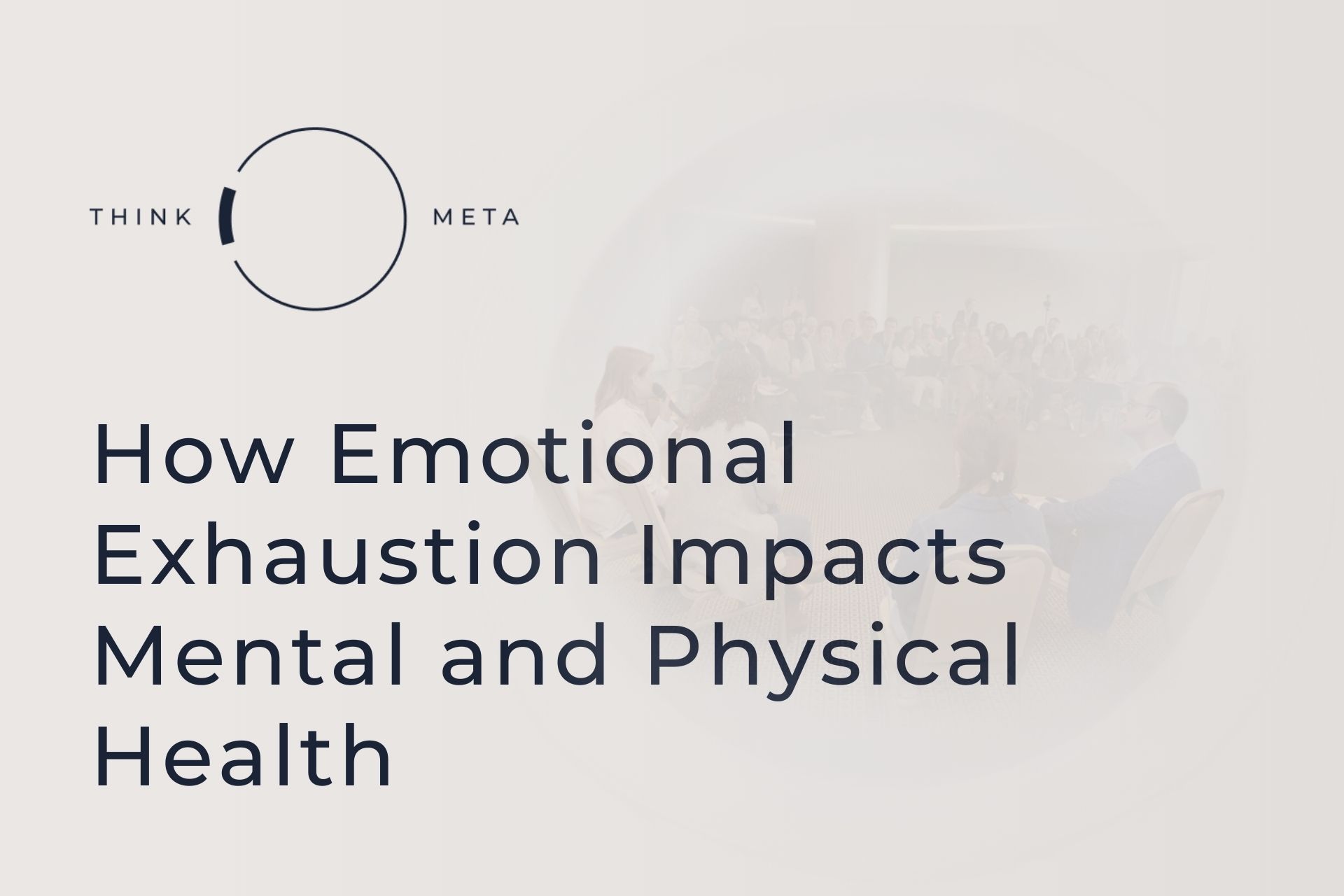How Emotional Exhaustion Impacts Mental and Physical Health

Modern lifestyle and constant increase of demands in professional and private life often lead to physical and emotional exhaustion. We even normalize being constantly tired as an inevitable part of adulthood. However, emotional exhaustion is a signal our body is sending us that we are running out of resources to cope with the stressors.
Understanding Emotional Exhaustion
Emotional exhaustion is one of the key symptoms of burnout, together with cynicism (depersonalization) and decreased professional efficacy (Magnusson Hanson et al., 2008). Typically, emotional exhaustion first shows up as a reaction to work-related stressors. After not having enough coping resources to deal with stress, a person starts to emotionally disengage from their work in an attempt to protect their resources. The final stage is reduced effectiveness at work since "coping efforts interfere with their performance" (Nadon et al., 2022; pp. 3).
Emotional exhaustion isn't just an unpleasant feeling but also a complex issue that negatively affects different aspects of functioning. One study (Bekker et al., 2005), which investigated emotional exhaustion in nurses, showed that people with higher emotional exhaustion had lower job satisfaction, higher turnover intention, and reluctance to work. Not surprisingly, emotional exhaustion was also associated with the number of hours spent working as well as childcare. Finally, emotional exhaustion increased with age.
In other words, with increased demands, there is a growing risk for emotional (and physical) exhaustion. Emotional exhaustion doesn't appear suddenly and dramatically. Rather it accumulates over time after unsuccessful attempts to cope. By the time it becomes evident, the consequences for mental and physical health have usually already occurred. That's why it's important for health coaches to recognize early signs of emotional exhaustion and to address them. Developing specific skills during coaching could be the additional resource that a person needs.
Causes of Emotional Exhaustion
Previous studies identified some common stressors and triggers of emotional exhaustion: long working hours, taking care of kids, and age could be predictors (Bekker et al., 2005).
Furthermore, the characteristics of a particular job could also increase the chances. A Swedish study (Magnusson Hanson et al., 2008) reported that emotional exhaustion could be associated with the perception of low control and lack of support, as well as demands at work or work instability (such as downsizing).
Similar results were obtained in another study (Baeriswyl et al., 2017). Namely, it was shown that workload increases emotional exhaustion. However, social support from coworkers could decrease this, regardless of workload.
Although factors that contribute to emotional exhaustion might seem too sparse and diverse, they all have one common characteristic. They all go beyond someone's capacity to cope. That's exactly why chronic stress is particularly dangerous and can lead to emotional exhaustion. When stressors are not acute and intense, we might not even take them seriously, but they create cumulative damage resulting in final collapse.
Signs and Symptoms of Emotional Exhaustion
Over time, several scales that measured emotional exhaustion are developed to identify people at risk. One of the widely used scales is the Maslach burnout inventory (Poghosyan et al., 2009). This questionnaire contained three subscales for three domains of burnout.
Based on Maslach burnout inventory, some of the key symptoms are:
- Feeling emotionally drained
- Waking up tired
- Feeling "at the end of the rope."
- Feeling as if working too hard at work
- Frustrated related to work etc.
Since these symptoms don't seem too dramatic or intense at first glance, it's easy to underestimate and ignore them. However, it is unlikely that without some intervention or changes in environment or mindset, emotional exhaustion will just resolve itself. Instead, more serious symptoms will show up, and functioning will be impaired.
Below are some of the key effects it can have on mental and physical health.
The Connection Between Emotional Exhaustion and Mental Health
Numerous studies have investigated the consequences of emotional exhaustion on our health.
Studies (e.g., Choi et al., 2018) showed an association between emotional exhaustion and depression, anxiety, stress, and trauma. As expected, participants who reported higher levels of emotional exhaustion also had lower quality of life, lower self-esteem, and resilience.
Not surprisingly, it also negatively affects cognitive performance. A German study (Feuerhahn et al., 2013) that investigated its influence on the cognitive performance of teachers showed that emotional exhaustion was associated with self-rated and peer-rated cognitive impairment. Difficulties that these teachers had experienced were also detected via a neuropsychological test that tested their memory and learning ability.
While burnout is considered to be a profession-related disturbance, it can occur in a wide variety of domains. Each time stressors overcome our coping capacity and persist; emotional exhaustion is expected to occur. Putting all your resources into "survival mode" will certainly impact your ability to function properly in various other areas of your life.
Therefore it is essential to recognize early warning signs and address them. This can be hard sometimes because of the so-called "hustle" culture that's become mainstream. However, the good news is that an experienced health coach will be able to detect signs and address emotional exhaustion in coaching sessions.
The Impact of Emotional Exhaustion on Physical Health
Although emotional exhaustion is usually considered a problem in the domain of mental health, the truth is that it also impacts our physical health. One study (Feuerhahn et al., 2013) showed that teachers who reported a higher level of emotional exhaustion also showed poorer physical health six months later.
The authors offered several explanations for this. One possible explanation is that people who are dealing with burnout engage in unhealthy behaviors that might bring at least temporary relief. It's also possible they can't rewind from work stressors and recharge their coping capacity. Finally, some changes in the immune system might even occur.
In other words, previous studies suggest that prolonged emotional exhaustion could have long-term consequences on physical well-being.
Strategies for Health Coaches to Help Clients Overcome Emotional Exhaustion
Different health coaches will provide distinct techniques for identifying and addressing emotional exhaustion based on their educational background and practical experience. However, there are some things that you can even practice alone.
Those are:
- Stress management. Although it is impossible to completely diminish stress in our life, there are ways to help us deal with it. Recognizing what is truly important, good prioritization and planning could help in preventing unnecessary stress. Also, accepting that we cannot control and predict everything will significantly decrease our experienced level of stress.
- Setting boundaries is another way we can manage stress. Setting boundaries will also protect us from going over capacity, whether in our professional or private life.
- Setting life-work balance. As previously mentioned, workload is one of the factors that contribute to emotional exhaustion. But it is important to recognize that feeling overwhelmed and unsupported in your private life can also contribute. You cannot do it all by yourself - so don't even try.
- Healthy lifestyle (healthy diet, exercise, regular sleep patterns). The irony is that when we feel emotionally exhausted, the last thing we often think about is a healthy diet and exercise. Even though we know it would help, it can be hard to find the energy for that. Therefore, exercise or diet change might not be an immediate solution during an acute crisis, but an acquired healthy lifestyle can help you in dealing with emotional exhaustion and its consequences.
- Meditation could be another way of dealing with stressors and finding balance. It doesn't require special equipment or extra time, so it's worth trying. There are many variations; you can explore and find what works best for you.
- Connecting with others - as previously mentioned, it was shown that social support could decrease emotional exhaustion. Take care of people around you, and they will take care of you.
- Find joy - sometimes, we feel emotionally exhausted not only because we work too much but also because we are not doing things that are in alignment with our values and desires. Find time for yourself and for things that you like, whether it's a cup of coffee in the morning, painting, or just playing with your dog.
- Take a break - the most important thing is to allow enough time for your body and mind to fully rest.
Finally, if you prefer to work with an expert or you just want faster and better results, you can always find a health coach who will help you in balancing your life. Use all available resources, and do not get discouraged if some technique does not work for you. You will find what does.
Emotional exhaustion should not be normalized as an unavoidable part of adulthood. Although most of us will at some moment feel that way (if you don't believe that, spend time with new parents!), it's important to acknowledge it and use all available resources. Untreated emotional exhaustion will lead to burnout and numerous mental and physical health symptoms. As a result, how you show up in both professional and private settings will be impaired. Once the balance is destroyed, it becomes harder to cope with even daily challenges.
The best thing you can do is prevent emotional exhaustion before it starts. Health coaching could help you in achieving that goal. Even if you currently are not dealing with it, the coach can help you strengthen your coping capacity and your ability to recognize the first signs of emotional exhaustion. All of that will help you achieve and maintain emotional well-being and be more resilient.
In the end, bear in mind adulthood does not imply being constantly tired and/or emotionally exhausted. If you feel like that - it is time for a change. You can do it.
Literature
Baeriswyl, S., Krause, A., Elfering, A., & Berset, M. (2017). How workload and coworker support relate to emotional exhaustion: The mediating role of sickness presenteeism. International journal of stress management, 24(S1), 52.
Choi, B. S., Kim, J. S., Lee, D. W., Paik, J. W., Lee, B. C., Lee, J. W., ... & Lee, H. Y. (2018). Factors associated with emotional exhaustion in South Korean nurses: a cross-sectional study. Psychiatry investigation, 15(7), 670.
Feuerhahn, N., Stamov‐Roßnagel, C., Wolfram, M., Bellingrath, S., & Kudielka, B. M. (2013). Emotional exhaustion and cognitive performance in apparently healthy teachers: A longitudinal multi‐source study. Stress and Health, 29(4), 297-306.
Magnusson Hanson, L. L., Theorell, T., Oxenstierna, G., Hyde, M., & Westerlund, H. (2008). Demand, control and social climate as predictors of emotional exhaustion symptoms in working Swedish men and women. Scandinavian journal of public health, 36(7), 737-743.
Marrie H. J. Bekker , Marcel A. Croon & Bibi Bressers (2005) Childcare involvement, job characteristics, gender and work attitudes as predictors of emotional exhaustion and sickness absence, Work & Stress: An International Journal of Work, Health & Organisations, 19:3, 221-237, DOI: 10.1080/02678370500286095
Nadon, L., De Beer, L. T., & Morin, A. J. (2022). Should burnout be conceptualized as a mental disorder?. Behavioral Sciences, 12(3), 82.
Poghosyan, L., Aiken, L. H., & Sloane, D. M. (2009). Factor structure of the Maslach burnout inventory: an analysis of data from large scale cross-sectional surveys of nurses from eight countries. International journal of nursing studies, 46(7), 894-902.

